Nutritionists have ingeniously promoted natural sweeteners as a better alternative to sugar, as a result of increasing health concerns about refined sugars and how they influence our wellness. Natural sweeteners are definitely worth a try, especially if you’re diabetic yet still need to fulfil your sweet cravings. To lower the amount of table sugar in your diet, a variety of alternatives and sugar substitutes, both natural and artificial, are available on the market.
Natural Sweeteners and Their Health Benefits
People are becoming more aware of what they consume. Customers value goods with clear labelling, natural ingredients, and preferably some additional benefits to the original. As a result, the food industry devised a strategy to bring sugar closer to consumers while also providing a healthy alternative. Because consumers are becoming more health-conscious, the demand for zero-calorie and organically derived sweeteners has increased substantially in the last decade. Take a look at the top favourites.
Stevia
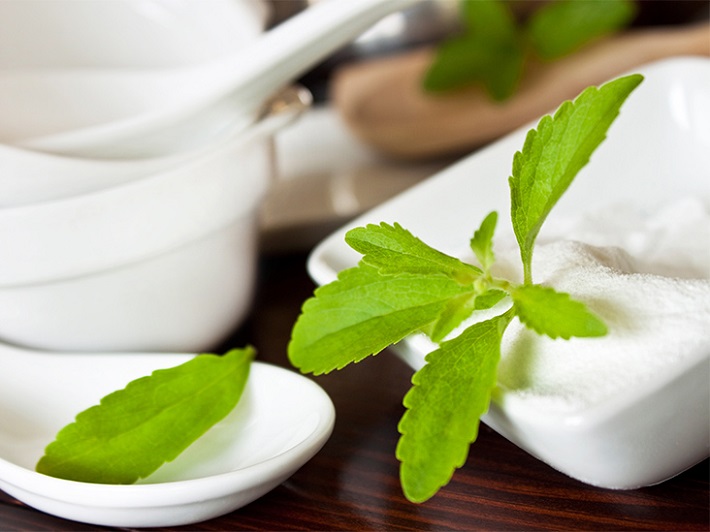
Stevia is a zero-calorie, sweet-tasting plant extract that’s increasingly popular in recent years due to its reputation as a more “natural” sweetener. It is derived from plant leaves, unlike artificial sweeteners, which are manufactured in a lab. There are various products and hundreds of recipes that can be made using the sugar substitute natural stevia. Stevia is a sweetener produced and processed from a South American plant that has been used for hundreds of years. Stevia is 200 times sweeter than sugar and has a better impact on our health than its artificial counterpart.
Research has shown that stevia can lower blood sugar levels, making it excellent for patients with type 2 diabetes and those trying to lose weight. If you want stevia powder, seek a product that exclusively includes that sweetener. Reading the ingredients is the only way to know what you’re buying. Do not be fooled by what the label claims. Lactose, dextrose, and other unpleasant ingredients might be hidden under meaningless phrases like “all-natural.”
Xylitol
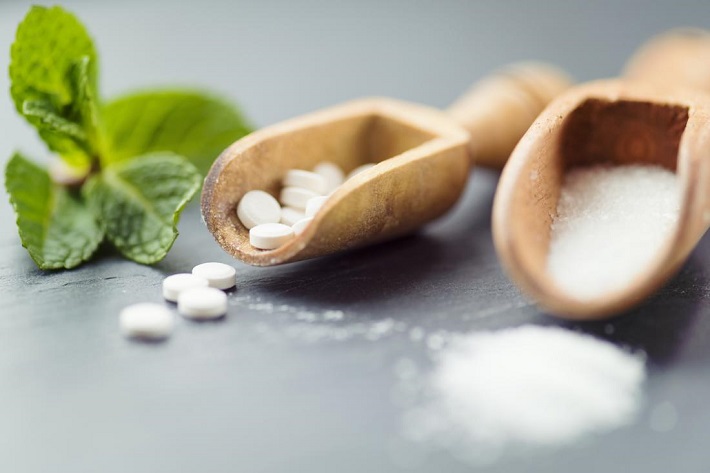
There are several health benefits associated with the use of xylitol. Xylitol is a naturally occurring sweetener that is alcohol-based, low in calories, and an excellent cavity preventive agent. Despite its similar look to sugar and having 46% less calories, it was not widely used as a sweetener in the food industry up until the 1960s, despite being found and isolated by Emil Fischer in 1891.
Xylitol has a sweet flavour, but unlike regular sugar we know, it is not converted to acids in the mouth which lead to tooth damage. It lowers the number of germs that cause tooth decay and also works against certain bacteria that cause ear infections.
Xylitol is significantly more expensive than sugar since it must be manufactured from raw resources, which must be plentiful in order to generate a fair supply. However, when the savings in dental care over a lifetime are taken into account, the extra expense compared against the advantages makes Xylitol look like a good option.
Erythritol
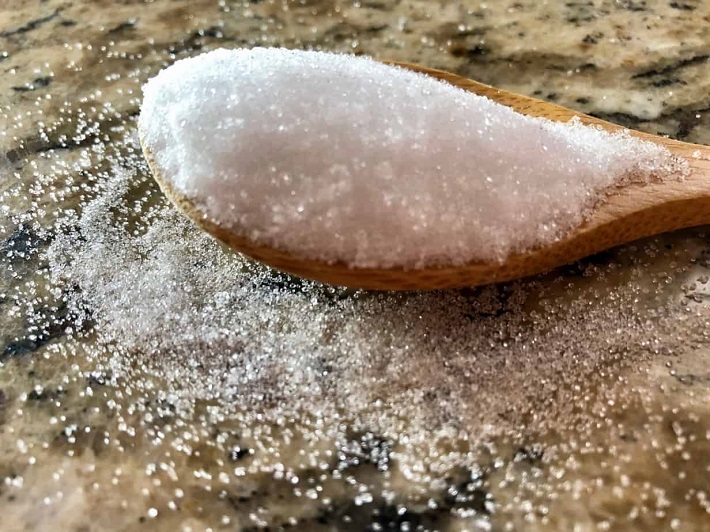
Erythritol is a naturally occurring sweetener that is increasing in popularity, particularly in the diet industry. It’s commonly used as a sweetener in low-calorie meals, sweets, and bakery goods. Erythritol, like xylitol, is a natural sugar alcohol. One gramme of erythritol contains zero calories and carbohydrates. John Stenhouse, a Scottish scientist, originally developed erythritol in 1848. Since the early 1990s, Japan has used erythritol in sweets, jellies, jams, chocolate, yogurt, drinks.
Because it appears to be less harmful than the contentious artificial sweetener aspartame, it’s no surprise that erythritol is becoming more popular as in means of reducing added sugar in people’s diets. Because the human body is incapable of breaking it down, it does not give calories or sugar to users. Erythritol is a preferable choice for diabetic individuals since it does not elevate glucose or insulin levels in the bloodstream, whereas the same amount of glucose raises insulin levels significantly. It also has no effect on the levels of cholesterol, triacylglycerol, or free fatty acids in the blood.
Monk Fruit Sweetener
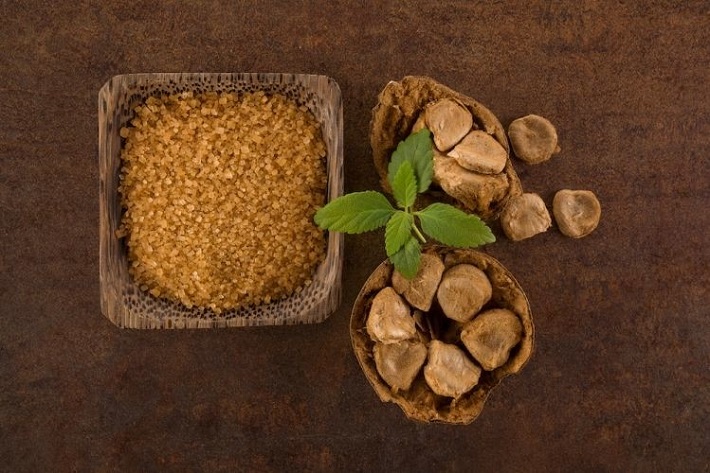
Monk fruit sweetener is made from the fruit itself, which is a tiny round fruit native to Southeast Asia. This natural sugar substitute has no calories and is 100–250 times sweeter than regular sugar. Monk fruit includes natural sugars like fructose and glucose, however, antioxidants called mogrosides give its sweetness. Monk fruit sweeteners are made by crushing the fruit, removing the seeds and peel, and collecting the juice.
Soft drinks, juices, dairy products, sweets, candies, and sauces are all examples of beverages and meals that include them. Monk fruit sweeteners can be used in baked goods since they are stable at high temperatures. However, because sugar adds to the structure and texture of meals, the final product using this sugar substitute natural sweetener may have a somewhat different look, texture, and flavour than those made with regular sugar.
Coconut Sugar
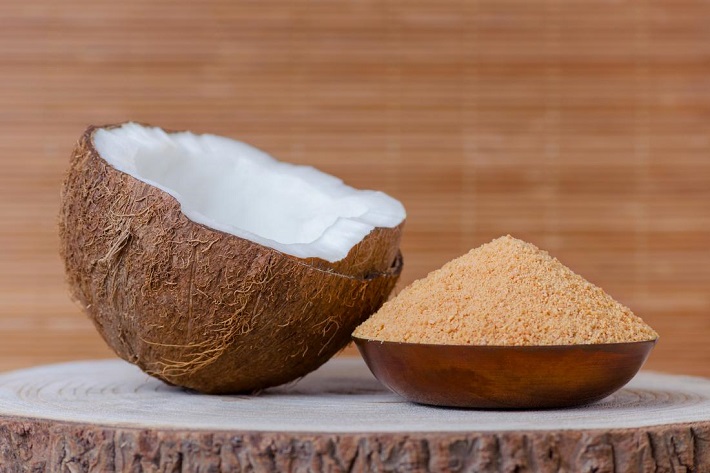
Coconut sugar is the dried and boiled sap of coconut palm, which is considered a healthier alternative to refined sugar. It has the appearance and flavour of clumped brown sugar, and it’s frequently used in baking and cooking as a natural sweetener. Because of its low fructose content and low glycemic index, coconut sugar has piqued the interest of many nutritionists. In comparison to normal white sugar, coconut sugar contains traces of minerals and antioxidants, and the rest being sucrose. Inulin, a soluble fibre found in coconut sugar, has been related to a decreased risk of blood sugar rises. Coconut sugar is nutrient-dense, and it’s particularly abundant in potassium and vitamin B-8, as well as having a high amino acid content. The amino acids aid in the metabolism of the body, as well as the growth, repair, and formation of bodily tissues, hormones, and enzymes.



